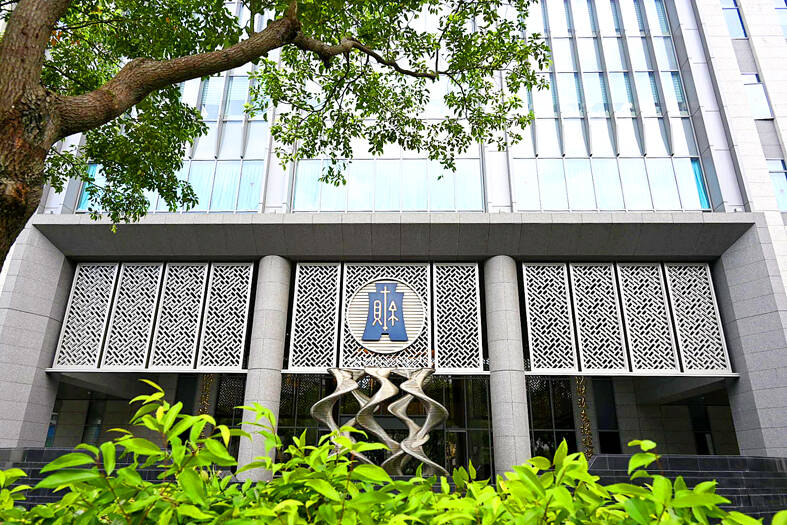Starting next year, Taiwan would adjust income tax rates for multinational enterprises (MNEs) to align with the Organisation for Economic Co-operation and Development’s (OECD) global minimum tax framework, the Ministry of Finance said in a statement on Wednesday.
MNEs with operations in Taiwan would be taxed at 15 percent, up from the current 12 percent, the ministry said.
The taxes would take effect when the businesses file their taxes in 2026, it said.

Photo: Chang Chia-ming, Taipei Times
Small and medium-sized enterprises as well as large businesses with an effective tax rate of 15 percent would not be affected, it added.
According to the OECD, the new tax rules apply to any MNEs with consolidated annual revenues of more than 750 million euros (US$831 million) for any two fiscal years within the past four years. These companies would be subject to a 15 percent effective minimum tax rate wherever they operate.
This measure aims to reduce the incentive to shift profits to low-tax countries, while also conforming with the ability-to-pay principle, the ministry said.
Currently, 60 countries or regions around the globe have announced they would adopt the global minimum tax. These include Taiwan’s neighbors Japan, South Korea, Singapore and Hong Kong, as well as some of Taiwan’s main trade partners, such as EU countries and Canada, the ministry said.

Nvidia Corp chief executive officer Jensen Huang (黃仁勳) on Monday introduced the company’s latest supercomputer platform, featuring six new chips made by Taiwan Semiconductor Manufacturing Co (TSMC, 台積電), saying that it is now “in full production.” “If Vera Rubin is going to be in time for this year, it must be in production by now, and so, today I can tell you that Vera Rubin is in full production,” Huang said during his keynote speech at CES in Las Vegas. The rollout of six concurrent chips for Vera Rubin — the company’s next-generation artificial intelligence (AI) computing platform — marks a strategic

SEMICONDUCTORS: The German laser and plasma generator company will expand its local services as its specialized offerings support Taiwan’s semiconductor industries Trumpf SE + Co KG, a global leader in supplying laser technology and plasma generators used in chip production, is expanding its investments in Taiwan in an effort to deeply integrate into the global semiconductor supply chain in the pursuit of growth. The company, headquartered in Ditzingen, Germany, has invested significantly in a newly inaugurated regional technical center for plasma generators in Taoyuan, its latest expansion in Taiwan after being engaged in various industries for more than 25 years. The center, the first of its kind Trumpf built outside Germany, aims to serve customers from Taiwan, Japan, Southeast Asia and South Korea,

REVENUE PERFORMANCE: Cloud and network products, and electronic components saw strong increases, while smart consumer electronics and computing products fell Hon Hai Precision Industry Co (鴻海精密) yesterday posted 26.51 percent quarterly growth in revenue for last quarter to NT$2.6 trillion (US$82.44 billion), the strongest on record for the period and above expectations, but the company forecast a slight revenue dip this quarter due to seasonal factors. On an annual basis, revenue last quarter grew 22.07 percent, the company said. Analysts on average estimated about NT$2.4 trillion increase. Hon Hai, which assembles servers for Nvidia Corp and iPhones for Apple Inc, is expanding its capacity in the US, adding artificial intelligence (AI) server production in Wisconsin and Texas, where it operates established campuses. This

Garment maker Makalot Industrial Co (聚陽) yesterday reported lower-than-expected fourth-quarter revenue of NT$7.93 billion (US$251.44 million), down 9.48 percent from NT$8.76 billion a year earlier. On a quarterly basis, revenue fell 10.83 percent from NT$8.89 billion, company data showed. The figure was also lower than market expectations of NT$8.05 billion, according to data compiled by Yuanta Securities Investment and Consulting Co (元大投顧), which had projected NT$8.22 billion. Makalot’s revenue this quarter would likely increase by a mid-teens percentage as the industry is entering its high season, Yuanta said. Overall, Makalot’s revenue last year totaled NT$34.43 billion, down 3.08 percent from its record NT$35.52